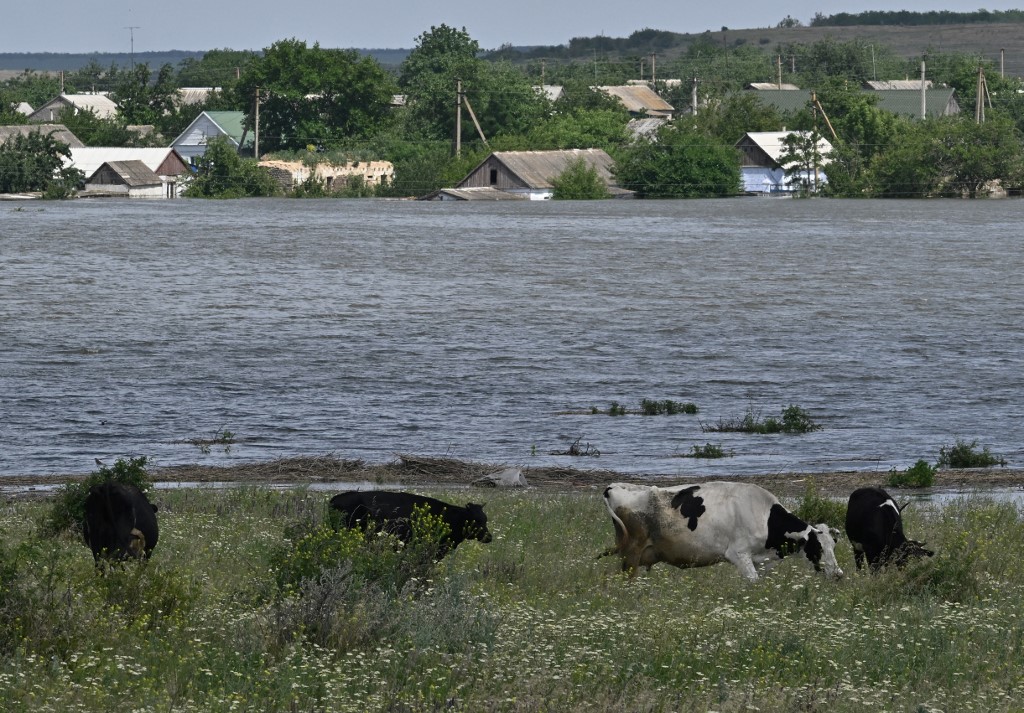AFANASIYIVKA, Ukraine, June 13, 2023 (AFP) – Yuriy, a 56-year-old Ukrainian farmer, stands chest-deep in water in his village of Afanasiyivka, gazing around in bewilderment.
A week ago, he was growing vegetables and fruit and grazing his cows. Now his land in the Mykolaiv region is deep under murky green water.
The destruction of the Kakhovka hydroelectric dam has caused massive flooding in the regions of Kherson and Mykolaiv.
The flooding was yet another crippling blow to farmers in the regions, who were already struggling to plant crops due to heavy shelling and the need to de-mine their land.
“What’s underwater here could have fed several large families for a year,” says Yuriy, watching drowned ducklings float past.
He places the blame squarely on Russian President Vladimir Putin.
– ‘Putin took everything’ –
“Putin took everything away from us,” he says.
According to Ukraine’s ministry of agricultural policy, several million tonnes of crops could be lost due to the flooding.
On the right bank of the Dnipro River in Kherson region, 10,000 hectares of agricultural land were flooded, while the flooded area on the Russian-controlled left bank is several times larger, the ministry estimated.
The small village of Afanasiyivka is still partially underwater due to flooding from the local Ingulets River.
Locals say the disaster caused the worst damage to potato crops and fields for grazing, as well as drowning smaller animals.
The water cut off the village, and soldiers have been ferrying people across. There is no electricity, phone connection or drinking water.
Olena Gulyuk, a 59-year-old farmer, comes to the crossing point to get bottled water from volunteers. Her hands and dress are covered in mud from trying to salvage her belongings.
– ‘Our rabbits died’ –
“Our hay got soaked. We had grain for animal feed. That’s spoilt too. Our hutches floated away with the animals inside. Our rabbits died, which is really painful,” says Olena, who has farmed her whole life.
“We’d planted potatoes, beetroot, carrots, everything you need for the household,” she adds.
“We’re villagers, so we plant everything to eat for a year. There’s nothing now.”
Afanasiyivka was occupied by Russian forces for seven months. Shelling damage is visible on the roofs of houses that now stand in water. The fields still have red signs warning of mines.
Some 470,0000 hectares of agricultural land in Ukraine are still contaminated with unexploded ordnance and mines, the agriculture ministry said in April.
“The Russians just want to destroy Ukraine. But we’re Ukrainians, we’ll survive,” Olena vows.
“They beat us and set our homes on fire, rockets flew over our heads here, but we survived… Now we will not allow ourselves to be drowned.”
But some farmers are less optimistic.
The flooding “ruined our land for crops. Nothing will grow for a decade, it’s an ecological disaster,” says 71-year-old Vasyl Palamarchuk, who farms in the village of Chornobaivka close to Kherson.
– ‘There’ll be hunger’ –
The grey-haired man, bare-chested and tanned, has piled up wet unripe corncobs, useless as food or animal feed.
Strawberry plants are rotting underwater and prices for soft fruit are going up at local markets.
In Kherson, market trader Olga Markova, 63, says local strawberries and cherries already cost more than in western Ukraine.
“The whole harvest got flooded. Now vegetables, berries and wheat will be expensive,” she says.
“How can people get money? How will they live? Already you can’t buy seedlings at the market — there’s nothing.”
“This year there’ll be hunger most likely. Kherson used to feed the whole of Ukraine and Russia. Now look what they’ve done to us,” she says.
Yuriy is clearing debris from his flooded greenhouse, where his strawberries had been ripening.
He angrily gestures at the water, calling for Russia to compensate farmers for the damage.
“That moron sitting in the Kremlin did it all,” he says.






